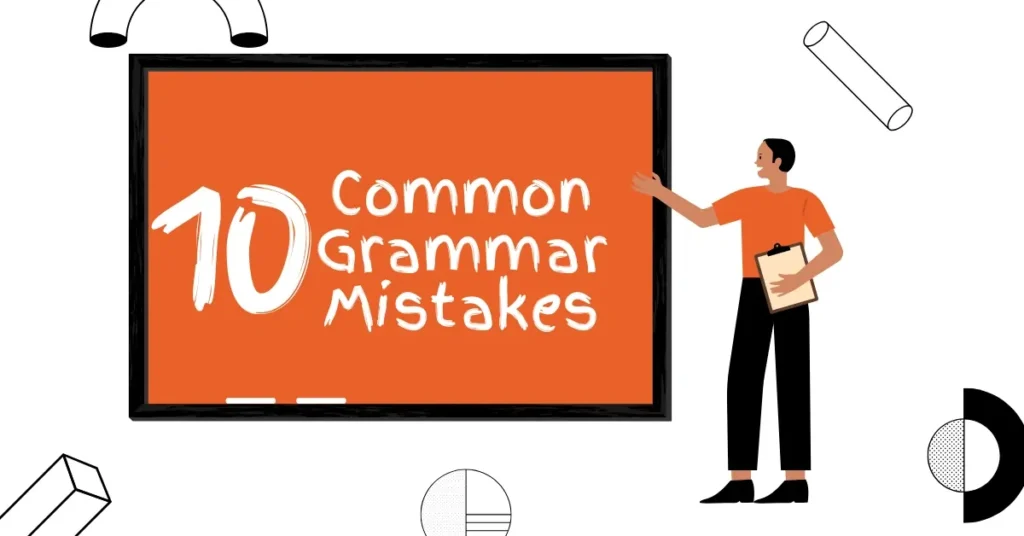In this article, you will learn about ten common grammar mistakes in English. These are simple mistakes that many people make, even if they have been studying English for a while. We will explain each mistake and give examples, so you can see the right way to use English grammar. This will help you understand how to use certain words correctly and make your sentences clear.
Learning about these grammar mistakes will make your English sound more natural and correct. By practicing and paying attention to these common errors, you will improve your English writing and speaking skills. This will give you more confidence in using English, whether you are speaking with friends, writing for work, or studying. Remember, learning English is about small steps, and understanding these mistakes is one step closer to being fluent.
10 Common Grammar Mistakes

- Confusing “its” and “it’s”
- Misusing apostrophes
- Using “me” instead of “I” in compound subjects or objects
- Confusing “who” and “whom”
- Using double negatives
- Confusing “lay” and “lie”
- Confusing “affect” and “effect”
- Using “less” instead of “fewer”
- Misusing “who” and “that”
- Confusing “good” and “well”
1. Confusing “its” and “it’s”
“Its” is a possessive pronoun, while “it’s” is a contraction of “it is” or “it has”. For example, “The cat licked its paw” (possessive) vs. “It’s raining outside” (contraction).
- The dog loves its new toy.
- It’s a sunny day today.
- The bird is sitting in its cage.
2. Misusing Apostrophes
Apostrophes are used to indicate possession or contractions, but they are often misused, such as using them to form plurals or in possessive pronouns like “hers” and “theirs” (which don’t need apostrophes).
- The cat’s fur is soft. (Possession)
- She doesn’t want to go. (Contraction)
- I like his coat, but hers is warmer. (No apostrophe needed in “hers”)
Also Read: 73 Common English Grammar Mistakes and How to Avoid Them
3. Using “me” instead of “I” in Compound Subjects or Objects
For example, saying “Me and my friend went to the store” instead of “My friend and I went to the store”. [common grammar mistakes]
- My friend and I are going to the park.
- My sister and I like to read books.
- He and I watched a movie.
4. Confusing “who” and “whom”
“Who” is used as the subject of a sentence, while “whom” is used as the object. For example, “Who is going to the party?” vs. “Whom did you invite to the party?
- Who is calling me?
- Whom did you see at the party?
- Who won the game?
Also Read: Which Grammar is Important to Speak English: Basic Rules
5. Using Double Negatives
Double negatives are two negative words used in the same sentence, which cancel each other out and create a positive meaning. For example, saying “I don’t want nothing” instead of “I don’t want anything”.
- I don’t have any money.
- She doesn’t need any help.
- They didn’t eat anything at the party.
6. Confusing “lay” and “lie”
“Lay” is a transitive verb, which means it needs an object, while “lie” is an intransitive verb, which doesn’t need an object. For example, “I am going to lay the book on the table” vs. “I am going to lie down on the bed”. [common grammar mistakes]
- I lay the book on the table.
- I need to lie down and rest.
- She lays her keys on the desk every day.
Also Read: How to be GOOD in English Grammar: 4 Steps
7. Confusing “affect” and “effect”
“Affect” is a verb, which means to have an impact on something, while “effect” is a noun, which means the result of something. For example, “The weather affected my mood” vs. “The effect of the weather on my mood was noticeable”.
- The rain affects my mood.
- The effect of the cold weather is making me sleepy.
- My words can affect how people feel.
8. Using “less” instead of “fewer”
“Less” is used for uncountable nouns, while “fewer” is used for countable nouns. For example, saying “There were less people at the party” instead of “There were fewer people at the party”.
- There are fewer cars on the road today.
- I have fewer pencils than you.
- She ate less sugar this week.
9. Misusing “who” and “that”
“Who” is used for people, while “that” is used for things. For example, saying “The person that I met yesterday” instead of “The person who I met yesterday”.
- She is the girl who helped me.
- The book that I read was interesting.
- The teacher who taught me English was kind.
10. Confusing “good” and “well”
Good” is an adjective, which means something is of high quality, while “well” is an adverb, which means something is done in a satisfactory manner. For example, saying “I am doing good” instead of “I am doing well” [common grammar mistakes]
- She did well on the test.
- The food tastes good.
- He plays soccer well.
Also Read: